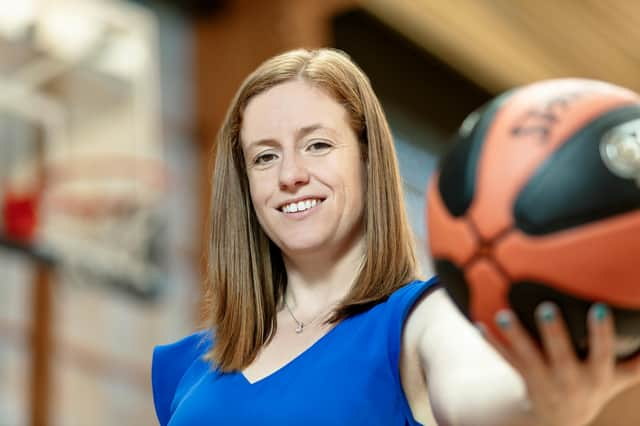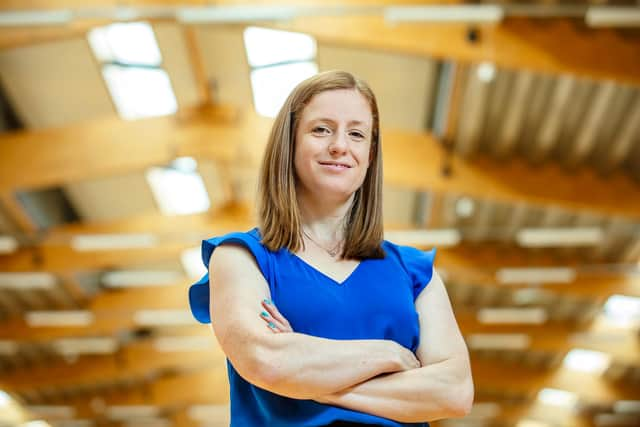The Scottish accountant who is one of Australian basketball's most valuable players


She didn’t play the sport at school and didn’t know anyone who did. The school didn’t have a basketball court and girls were encouraged to play hockey or netball.
McLuckie turned to judo, the Japanese martial art growing in popularity at the time, rather than basketball – the sport invented by James Naismith, the son of Scottish immigrants to Canada.
Advertisement
Hide AdAdvertisement
Hide AdIt is unlikely then that she has become one of the most influential leaders in the sport, on the other side of the world, where Mr Naismith’s invention is treasured and growing its huge popularity.


As chief financial officer of Basketball New South Wales, based in Sydney, Australia, McLuckie brings her financial skills as a Fellow of the Association of Chartered Certified Accountants to manage the finances of the sport from grassroots all the way up to the professional level.
And basketball is a big deal in Australia, ranking often in the top five sports behind the likes of cricket, both codes of rugby, Aussie-rules football and soccer for popularity.
The FIBA Women’s Basketball World Cup will take place in Sydney in 2022 and it will be her job to ensure the global event translates into greater participation, increased membership and ultimately more money for the not-for-profit organisation that oversees the sport.
An estimated 30 per cent of all Australian children play basketball regularly, which has seen the sport transformed in recent decades.
Twelve Australia-developed players are now playing in the famous NBA in the United States, including Matthew Dellavedova of the Cleveland Cavaliers and Josh Green of the Dallas Mavericks.
So how did a Kilwinning judo-lover with zero experience in basketball end up as one of its major players?
McLuckie, who studied accountancy at Stirling University, said: “Growing up in Kilwinning, I never came across basketball at all. We had football, but mainly for the boys, and field hockey or netball. Most of our exposure to sport came through school.
Advertisement
Hide AdAdvertisement
Hide Ad"Sadly, basketball was never on my radar. And I didn’t know anyone that played it growing up. I think it would’ve been a sport I would have enjoyed at the time if given the opportunity.
“My sport growing up was judo and I was pretty good at it between the ages of eight and 14. I loved competition and the adrenaline brought by that.
"As with most teenage girls, I gave it up at 14, something I will always regret. I then took it up again as an adult at 23, struggled, but worked incredibly hard to get my black belt.
“Netball seems to be taken up at a much younger age than basketball in Scotland, meaning that a lot of girls and young women have already found their sport by the time basketball is on their radar.
“Facility availability is a huge challenge for basketball in Scotland. It’s easier to put up a portable netball hoop on a school playground, or football court, than it would to put up a basketball ring with a backboard.
"Multi-sport indoor facilities tend to focus on set up for futsal, indoor hockey. When councils are developing new facilities, they need to look at widening the ‘multisport’ element and making them more suitable for a wide variety of sports, including basketball.’
McLuckie, who previously worked in finance for Edinburgh sports hospitality company MatchPoint Group, believes the key to fostering sporting success in any sport, especially ones that are not already popular like football, rugby and golf are in Scotland, is to introduce them early at school.
She said: “Kids are introduced to basketball at a young age in Australia through school programmes whereas in Scotland it’s much later, usually through their own interest in joining local clubs recreationally.
Advertisement
Hide AdAdvertisement
Hide Ad“In Scotland, the availability of basketball facilities is low compared to Australia, meaning that walking past a basketball game and harnessing an interest is lower.
“Of course, weather has an impact too.”
McLuckie said she believes a government funded programme called Sporting Schools gives Australian pupils a leg up, adding: "Schools apply for funding which they can then use to engage sporting organisations and their coaches to either deliver sport specific programmes to schools through PE or after school programmes, or provide teacher education and training, for them to then deliver short introductions to a wide variety of sports.
“For all sports linked to this programme, the exposure and growth rates for their sport has been phenomenal. For schools, approximately 80 per cent of Australian schools have increased children’s participation in sport.
"In Scotland, Sport Scotland works with local authorities to deliver the Active Schools programme using Active Schools co-ordinators. And while this is promising, the key to the success in Australia is having the expertise of the sporting organisation’s coaches deliver their own sport and with a wide variety.
“Often in Scotland, PE teachers are dedicated to the sports that they have trained in and stick to what they know.
“I think that if Scotland were to harness the expertise of local sporting organisations, kids would be able to try a wider variety of sport and find what really interests them. It would also take a huge amount of pressure away from PE teachers.”
McLuckie launched her global sporting career by virtue of obtaining an international professional qualification with the Association of Chartered Certified Accountants (ACCA), which has administrative headquarters in Glasgow.
Craig Vickery, head of ACCA Scotland, said: “Caroline’s rise to an influential position in the sporting world is testament to her dedication both to sport and to her profession.
Advertisement
Hide AdAdvertisement
Hide Ad“Grassroots sport depends heavily on small sponsorships and an army of volunteers willing to give their time and energy. Chief financial officers like Caroline use their financial skills to make sure their organisations are able to inspire the next generation to take part in sport.”
Comments
Want to join the conversation? Please or to comment on this article.